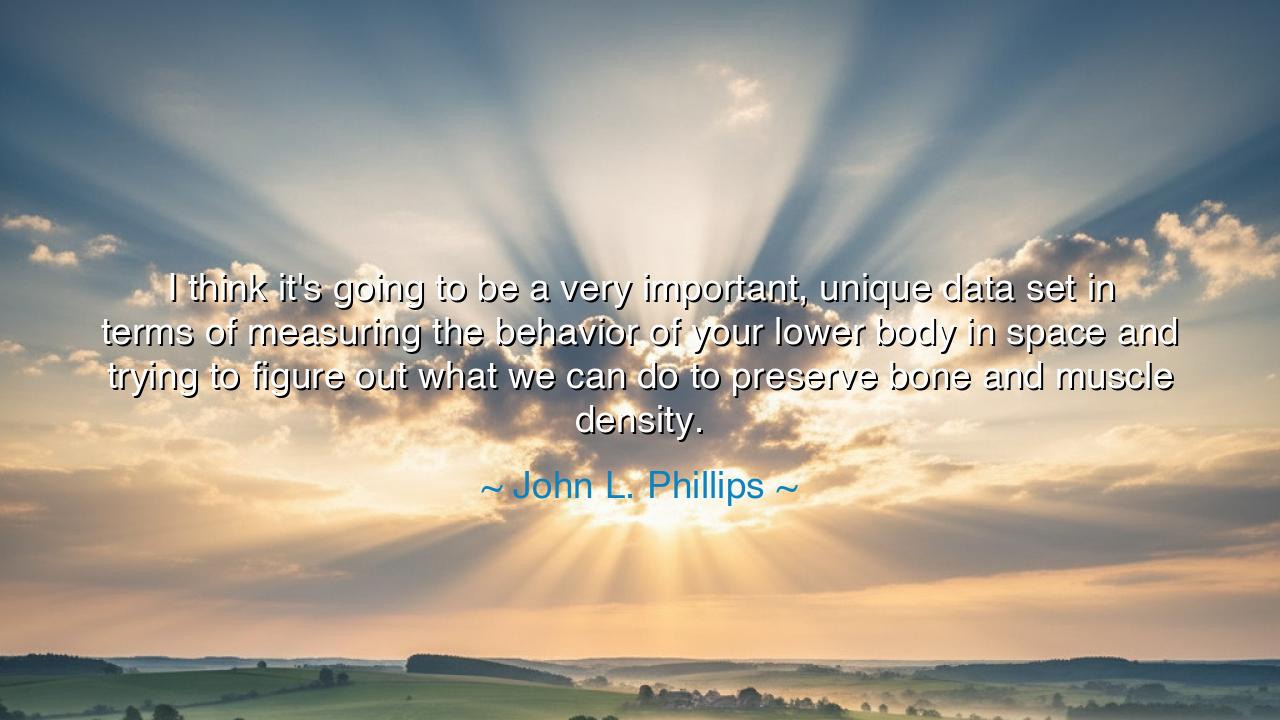
I think it's going to be a very important, unique data set in
I think it's going to be a very important, unique data set in terms of measuring the behavior of your lower body in space and trying to figure out what we can do to preserve bone and muscle density.






"I think it's going to be a very important, unique data set in terms of measuring the behavior of your lower body in space and trying to figure out what we can do to preserve bone and muscle density." These words, spoken by John L. Phillips, highlight the remarkable journey of human exploration and the challenges that come with pushing the limits of our existence. In this statement, Phillips speaks of the importance of understanding and preserving the human body in the harsh and unfamiliar environment of space. As humanity ventures further into the cosmos, we are faced with not just the wonders of the universe, but the dangers and difficulties that come with living in an environment where the very forces that sustain life on Earth—such as gravity—are absent. This insight is more than just scientific—it is a reflection of humanity’s continual struggle to adapt and thrive in an ever-changing world, both terrestrial and cosmic.
The human body has always been the vessel through which we experience the world. From the dawn of time, ancient civilizations recognized the body’s vulnerability and sought to protect and strengthen it. The Greeks, with their ideal of the "kalokagathia"—the unity of physical beauty and moral virtue—understood that to maintain balance in life, one must care for both the body and the spirit. They saw the body as a temple, one that required care and discipline. But the very space in which the body exists—whether on Earth or in the void of space—affects how it functions. Today, John L. Phillips’ statement speaks to the next evolution in this care, the understanding of how the body behaves in extreme environments and what we can do to preserve its strength and integrity.
The mysteries of space have long been a source of both awe and fear. Galileo and Kepler, the great astronomers of the past, peered into the heavens, trying to unlock the secrets of the stars and planets. But even as they charted the paths of the planets, they could not have imagined that one day, human beings would venture into the void itself, placing their lives in the very realms they had once only studied from afar. As humanity ventures farther into the cosmos, we are confronted with the stark realities of living in space. The human body, once perfectly suited to life on Earth, struggles to survive in the zero-gravity environment of space, where the muscles and bones we take for granted weaken without the forces of gravity to keep them strong.
A great historical example of this struggle can be seen in the Apollo missions to the Moon. When the astronauts returned to Earth after their missions, they experienced great difficulty in adjusting to the weight of gravity. The muscle atrophy and bone loss they experienced were stark reminders of how fragile the human body is when deprived of its natural environment. Their experiences were not just physical challenges but a symbolic reminder of the limitations of the human body and the unpredictability of the unknown. Just as they faced unexpected challenges on the lunar surface, the astronauts who venture into deep space must grapple with the effects of long-term exposure to environments that differ drastically from our own.
Phillips’ mention of bone and muscle density is not merely a scientific observation; it is a call to action. Humanity, ever resilient, has faced countless challenges in the pursuit of progress. Whether it was the early pioneers who crossed unknown seas to find new lands, or the scientists who created the tools to bring us to the Moon, each challenge has required us to adapt, to learn, and to grow. The data set Phillips refers to is a crucial part of that learning process. Through careful study of how the body responds to space travel, we will discover not just how to protect astronauts but how to unlock new potential for human growth and survival in space. This is the next step in humanity’s age-old quest to conquer the unknown and ensure our survival beyond Earth.
The lesson Phillips imparts is a lesson of adaptation and understanding. The human body, though strong, is not invincible, and it requires careful attention and innovation to thrive, especially in new and unfamiliar environments. Just as the Greeks understood the need to balance physical strength with mental discipline, we must now apply that balance to our understanding of human limitations in space. The data gathered in space will help not only astronauts but will offer insights into improving human health on Earth as well. Space exploration, then, is not just about extending our reach into the cosmos, but about understanding the deeper connections between our bodies, our environment, and our potential to thrive.
In your own life, take this lesson to heart. Just as the astronauts must learn to adapt to the challenges of space, so too must we face the challenges of our own existence. Growth requires us to understand our limitations, but also to push against them. Whether we are facing the unknowns of career, relationships, or personal health, the same principles of adaptation, understanding, and innovation apply. Take the time to understand your body, your mind, and the forces that shape them. Be mindful of your strengths and weaknesses, and never stop learning how to improve, adapt, and thrive, both here on Earth and in any frontier you choose to explore. The lessons of space, in all their complexity, hold the keys to unlocking the future of humanity—and the future of each of us.






AAdministratorAdministrator
Welcome, honored guests. Please leave a comment, we will respond soon